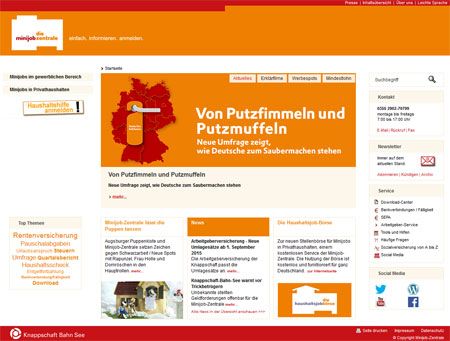Illegal employment in the household
Cleaning, vacuuming, cooking food, cleaning windows or washing – many people have little desire or no time for it. A cleaning assistant is a real relief in this case. Unfortunately, it costs a lot of money, so many people try to cheat. Undeclared work is very widespread in this area.
Cleaning help widespread
Twelve percent of West Germans have their home cleaned by their cleaning help, while in East Germany the figure is 6 percent. Depending on the household income, the frequency of employing a household help also increases. 20 percent of households with a net income of over 3.500 euros employ a cleaning help. For households with an income below 2.000 euros, on the other hand, it is only 5 percent.
Above all older people over 60 years let help themselves with the cleaning. In most cases, a cleaning lady comes to the house once a week.
Undeclared work
But household helpers are not always registered correctly. Ten percent of German households employ their cleaning help on the dole or have done so in the past. A further eleven percent can well imagine having a cleaner work undeclared.
In most cases it is probably a matter of saving money. And that on both sides. The employer saves taxes and contributions and the cleaner can pocket the wages 1:1. However, this is not entirely well thought out.
In the Minijob-Zentrale were in June 2012 over 242.000 mini-jobbers employed in German households are reported. But that is according to the Minijob-Zentrale only a fraction of the really active domestic helpers.
However, neither the undeclared workers nor the employers seem to have a guilty conscience. The “offenses” are not insignificant. The illegal cleaners are neither insured against illness nor do they pay into a health insurance scheme. They also evade taxes.
In addition, it can be extremely expensive for employers if the illegal domestic help is injured or has an accident during the activity. And as one knows, most accidents happen just in the household. So it’s only a matter of time before something happens.
According to research by the Forsa Institute, 12 percent of the households concerned do not even want to have known that cleaning helpers have to be registered. In the case of 23 percent, the aids themselves are said to have insisted that they not be registered. And 15 percent found the registration process too complicated.
Register cleaning helpers!
Thereby the correct registration of a household help is anything but difficult. The Minijob-Zentrale of the German Pension Insurance Knappschaft-Bahn-See is responsible for this. The takes care of minor employment nationwide, which also includes domestic helpers.
Screenshot of the homepage of the Minijob-Zentrale
It also takes care of the registration and collection of accident insurance premiums. So you are on the safe side as a private household in the case of the cases.
On the homepage of the Minijob-Zentrale, you can find all the information you need on the subject and can also register your cleaning help online right away.
It really does not get much easier. And that saves a lot of trouble and a lot of money if you get caught or something goes wrong.
